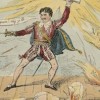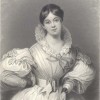
Jonathan Mulrooney, “Edmund Kean, Event”
This article considers Regency actor Edmund Kean’s presence as a figure in the theatrical news of the day, arguing that Kean’s acting style, coupled with changes in periodical print culture, reframed the relation between the British theatrical tradition, the actor’s stage performance, and audience reception. Emphasizing an “illegitimate” grammar of representation characterized by gesture, mobility, and emotional transition, Kean enacted new forms of subjectivity that aligned with emerging modes of theatrical criticism to shape readers’ concepts of their own private experience and their imagined engagement with public events.

Angela Esterhammer, “1824: Improvisation, Speculation, and Identity-Construction”
Literature and cultural history of the year 1824 reflect the prominence of improvisation and speculation as ideologies and modes of action. Both these terms suggest hasty action that lacks a solid or profound basis, that responds to contingencies and constructs its own (pseudo-)reality. This article explores modalities of improvisation and speculation by focusing on the interrelated themes of ephemerality, appearance, and identity-construction in texts and performances of the year 1824, including influential works of poetry and fiction, the burgeoning periodical press, and new forms of theatrical entertainment.
